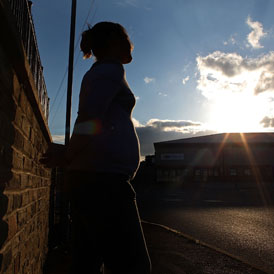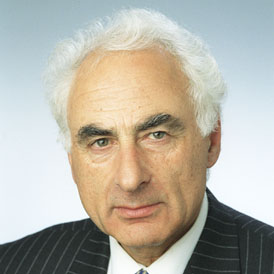Trafficked woman ‘was sent back to be tortured’
Exclusive: A woman deported from Britain to be raped and tortured in Moldova has won damages from the Home Office but the project that took her in has had its funding withdrawn, Channel 4 News learns.

A woman who could have been rescued from a life of sex slavery in Britain as a teenager but was sent back to be tortured and raped by human traffickers in Moldova has won undisclosed damages from the Home Office.
In what is thought to be the first case of its kind, the woman sued the British Government for violating her human rights by sending her back to her home in eastern Europe without taking into account the grave danger she was in.
And, as Channel 4 News Home Affairs Correspondent Simon Israel has revealed, the Poppy Project, the charity group that finally helped the victim, has had its Government funding withdrawn.
The woman was arrested after a raid on a London brothel in 2003 and told police she had been forced into prostitution. But the then home secretary David Blunkett decided to deport her back to Moldova, as the country was considered safe.
Within days, the woman’s former captors caught up with her, torturing and raping her before returning her to a life of sexual exploitation. She was trafficked to Britain for a second time before she finally escaped and was granted refugee status.
The Home Office planned to contest the woman’s claim for £130,000 in damages and a High Court case was due to begin today, with the victim expected to relive her ordeal in the witness box. But the Government agreed to pay damages on Friday, days after a newspaper article about the case appeared.
The timing prompted a former MP who has championed the woman’s cause to accuse the authorities of behaving “disgracefully”.
She is actually a very delightful, intelligent person. It’s hard to believe she has gone through what she has from the age of 14. Anthony Steen
The victim, who cannot be named due to the ongoing risk of violence against her and her family, was kidnapped at the age of 14 from a children’s home in the former Soviet republic of Moldova and was sold to various pimps in Italy, Turkey, Hungary, Romania, Israel and the UK.
Police arrested her after raiding a brothel in Harrow, northwest London, in April 2003. Aged 18, the woman told the authorities what had happened to her. But she was charged with possession of false documents – given to her by the traffickers – and deported under a fast-track process.
Her lawyers say her trafficker, an Albanian man who posed as her boyfriend, was not investigated and was even allowed to visit her nine times in Holloway prison and Oakington Detention Centre in order to intimidate her.
Court papers prepared by the woman’s lawyers claim she was raped on a daily basis for years, subjected to constant threats of violence, and never received any payment for working as a prostitute.
The woman told the Sunday Times the traffickers caught up with her days after she was flown to Moldova. She said they forced her to dig her own grave, gang-raped her and pulled out one of her teeth with a pair of pliers, allegations that cannot be verified but are backed up by medical evidence.
Back in the hands of the gang, she was trafficked back into Britain via Ireland in 2004, and finally escaped when she managed to run from her Israeli guards and flag down a passing car dressed in pyjamas.
She was eventually referred to the Poppy Project, which identified her as a victim of sex trafficking and helped her make an asylum claim.
In 2008 the woman was granted refugee status in recognition of the fact that the Moldovan authorities could not offer her adequate protection against her traffickers.
Channel 4 News has learned that the project has now had its funding from Whitehall withdrawn after nine years of caring for the victims of trafficking.
The Ministry of Justice (MoJ) has awarded a three year contract to the Salvation Army instead.
An MoJ spokesman said: "We have guaranteed funding of up to £2 million a year for the next three years to fund specialist support for adult victims of human trafficking.
"We have drawn on the expertise of anti-trafficking groups to develop a support system that offers victims a more diverse range of services, which will be tailored to their individual needs."
Channel 4 News understands that some services will be subcontracted to other charities.
Two months ago the Poppy project took the ministry to court, claiming its proposals risked breaching European laws guaranteeing protection to trafficking victims.
National co-ordinator Abigail Stepnitz says the decision to withdraw the funding represents a fundamental change in the way the Government cares for these vulnerable women.
The woman now lives in London and enrolled on an IT course a few weeks ago.

The former Conservative MP Anthony Steen, who now chairs the Human Trafficking Foundation, and Baroness Nicholson of Winterbourne, then an MEP, managed to arrange with the Moldovan authorities for the victim’s daughter to be sent to the UK to join her mother.
Mr Steen told Channel 4 News the people trafficking business “is like a huge underground lake”, adding: “It’s a vast undisclosed, unseen operation. It’s bigger than the slave trade right across Africa for 350 years. This is just the tip of the iceberg. It’s massive.
“The UK Border Agency comes off particularly badly. They sent her back to be tortured. The agency has behaved disgracefully. Their sole job is to get people out of Britain, even if they have been tortured.”
He added: “This deal was struck at the eleventh hour. The victim was extremely distraught about the prospect of going into the witness box and having to relive what she has been through.
“It would have gone on for two days and they were gambling that she wouldn’t want to do it.
“She is actually a very delightful, intelligent person. It’s hard to believe she has gone through what she has from the age of 14.
“These women don’t want charity. What they want is a proper job. They want to be part of society. They don’t want to be given benefits. The one thing that she is resenting is having to live on benefits.”
He went on: “It is disgraceful. This is an indictment of the Government to rethink how it settles asylum cases and why it takes people to the wire, as if enough damage hasn’t already been done to them. I hope the Government is going to learn from this.”
Home Office Minister Damian Green said: “This very disturbing case shows why our approach to Human Trafficking has changed significantly since 2003. In recognition of the need to identify victims of trafficking the UK ratified and brought into force the Council of Europe Convention on Action against Trafficking.
“We have also introduced a National Referral Mechanism to refer and identify victims of trafficking and established mandatory training for all frontline UKBA staff on human trafficking awareness. In March we indicated that we will opt-in into the EU Directive on Human Trafficking subject to Parliamentary scrutiny.
“The UK has become a world leader in fighting trafficking and has a strong international reputation in this field.”
The victim said in a statement released by her solicitors Birnberg Peirce and Partners that she “hopes the Home Office will learn the lessons from her experience, so that other trafficked women who come to the attention of the authorities are identified as victims instead of being treated as criminals and immigration offenders, so that they are rescued instead of being handed straight back to their traffickers for further rape and ill-treatment”.
The Association of Chief Police Officers (ACPO) published research last year that suggested 2,600 women were trafficked into the UK for prostitution.
ACPO said 1,300 of those women were from China and most of the rest were from southeast Asia.
The report also identified 9,600 women it described as "vulnerable" adding: "Although they have elements of vulnerability to trafficking, most are likely to fall short of the trafficking threshold. There may be cultural or financial factors which prevent them from exiting prostitution (or seeking help to do so) but they tend to have day-to-day control over their activities, and although they may have large debts, they generally do not consider themselves to be debt-bonded."
ACPO's figures, which came from a variety of sources including firsthand interviews with women working in the sex industry, showed that 4,100 of those women were from Eastern Europe and 3,700 were from China and southeast Asia.
The association qualified its findings by saying: "Human trafficking is a covert crime. This means any attempt at measuring or estimating it is inherently difficult."
Other groups put the number of trafficked women in the UK much higher. The charity Chaste, which runs several safe houses for victims, puts it 4,000, while the Human Trafficking Foundation says there could be as many as 10,000 trafficked women working in the sex industry in Britain.




